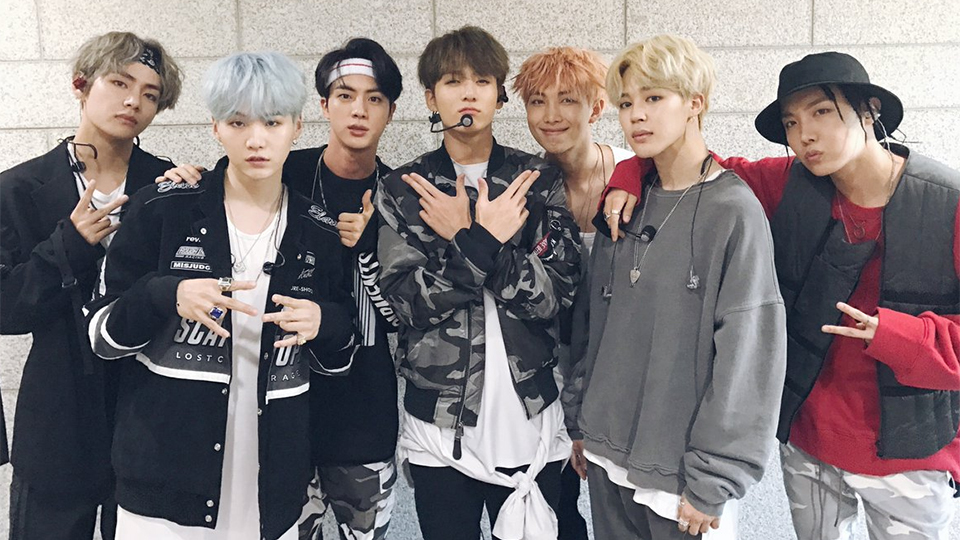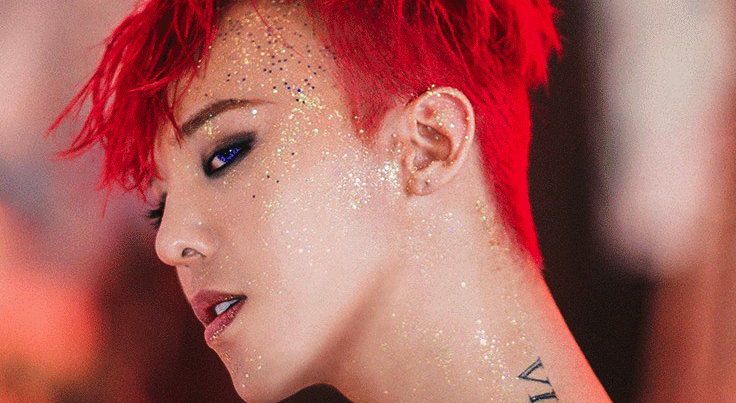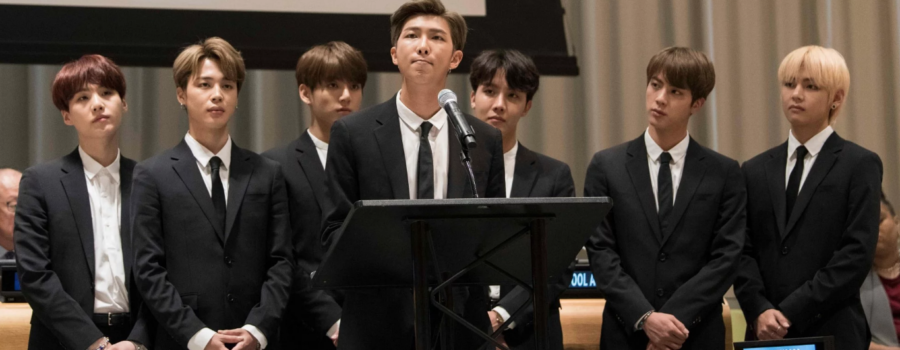It is getting harder to explain the BTS phenomenon to people without sounding like the facts are being made up. Industry execs and celebrities have resorted to comparing it to Beatlemania — which sounds like an exaggeration until one witnesses ARMY in person (the name for their worldwide and fiercely devoted fan base). ARMY generates more traffic for BTS on social media than Donald Trump and Justin Bieber…. combined. Their latest album has surpassed 1 billion streams on Spotify and is their second album to hit #1 on the Billboard 200 album charts.
Along with many other Americans, the first time I took notice of BTS was their debut performance at the 2017 American Music Awards. Not only was the electricity in the crowd undeniable, but many fans present were singing along in Korean. As a Korean-American who grew up in mostly white neighborhoods occasionally teased of his Asian heritage, the sight was astonishing.
http://https://www.youtube.com/watch?v=NDO3qkXRj7Y
What cannot be heard clearly from the above video, is how amazingly loud and organized BTS ARMY is. Their patented fan chants are the envy of college football student sections and must be heard to be believed (below).
Being the father of high school and junior high age kids, BTS chatter is everywhere in our house. The range of celebrities that are participating in the fandom spans anywhere from John Cena to Warren G, from Ansel Elgort and Matthew McConaughey to Shawn Mendes. Pretty soon, BTS was seemingly everywhere I looked — even down to the books that were being passed around in our house.

Leaflet of Tomi Adeyemi’s “Children of Blood and Bone,” inserting a gratuitous reference to her time spent watching BTS videos.
Right up to this weekend, their presence in the news appears equally ubiquitous as they continue their world tour (recently making appearances at the United Nations, the Tonight Show, Good Morning America, and coming soon in the UK, The Graham Norton Show). Their stadium show in New York Citi Field sold out in 10 minutes: the 40,000+ crowd signifies the largest concert in history for a Korean band in the United States.
“But Why Are They Popular?”

A common explanation for the astonishing worldwide success of BTS is often sheer incredulity or a blanket appeal to the whims of raging, screaming teenage girls (you see similar explanations for other smashing successes like Jim Cameron’s Titanic). But as Vulture’s Jakob Doruf aptly writes: frequent attempts to assign credit of their success to the passion of BTS fans “offer as much insight as does the observation that someone is rich because they have a lot of money.” Such comments, in its dismissiveness, reveal a distrust about the substance of this “boyband from Seoul” and the talents that underscore their success.
Indeed, when the popularity of BTS is shrugged off as just another teenage girl craze, what it actually encodes is something quite insulting to young women. The implicit assumption is that women cannot be reliable indicators of works of substance or importance. Furthermore, when critics and naysayers pan BTS as “Asians in makeup” who are “inexplicably famous,” the undertones of such sentiments reveal a mixture of racism and outmoded views on western masculinity. Social media tweets were full of this kind of disbelief when BTS won Social Artist of the Year over Justin Bieber and Taylor Swift (this one below is exemplary):
how did these asians wearing makeup beat ACTUAL FAMOUS PEOPLE
— kaley (@bieberzmahone) May 22, 2017
It’s interesting that similar criticism about makeup and androgyny are not raised when Billie Joe Armstrong, Adam Lambert, or Bono wear stage makeup. What is often missed here is that BTS’s popularity, particularly among women, represents a reaction of sorts to the very standards of masculinity that have long been unquestioned in Western media and entertainment.<FN 1> It also reveals a cluelessness to the impact Anime/Manga bears on Asian entertainment aesthetics.

BIGBANG’s frontman, G-Dragon and his trendsetting popularity is a recent example of the changing conversation around male beauty and masculinity
The reasons behind BTS’s unprecedented success are actually fairly easy to identify. Beyond the arresting visuals and impressive choreography, BTS fans are united in crediting the infectious likability of the members themselves. What is consistently pointed out by their fans is that the group members reveal genuine humility, tireless cheerfulness, true loyalty to each other and their fans, startling talent, and an authentic kindness that is a breath of fresh air compared to many of the musical acts today.
BTS and Tribalism

BTS in Concert
If you look closer at this fanbase, one of the most striking aspects you notice is the breathtaking range of its diversity of age groups, ethnicities, and backgrounds. In an increasingly tribal world, BTS’s united fanbase represents an encouraging singularity. Questlove, after a recent performance on the Tonight Show, tweeted:
man just getting my hearing back from #BTSonFallon —it was some NKOTB 90/Duran Duran 82/Beatles Sulivan/James Brown TAMI Show level of screaming in 6b today, I never knew an act in entertainment could still command that kinda frenzy in today’s climate
— Livin My ?uest life (@questlove) September 26, 2018
For most BTS fans, being a fan means learning a different language as they learn to chant and sing in Korean. Fans from different countries constantly trade translations, swap theories on the various storylines and Easter eggs from the band’s videos and liner notes, and yes, exchange opinions on their bias (fan-speak for favorite member). This interaction opens up each fan to a new kind of cultural exchange with the group, other fans, and fanbases from different countries and backgrounds. In an age of populism where the lines that divide are much more emotionally entrenched than it has been in recent memory, where racism has moved from subtle, micro-aggression to full-frontal bigotry, the global fan community known as ARMY represent a small solace that change is possible, however humble that change may seem. Seeing such passion within a wide diversity of people singing in a language foreign to their own, united in their adoration for an under-represented musical act is one of the few things in the news today that signals hope that we can find new ways of bringing different people together.
The Change That Women Can Bring

No, BTS is not off to save the world with their on-point dance choreography, brightly-colored streetwear, and positive messaging. What they are showing, however, is the possibility that significant differences can be bridged in today’s climate. Perhaps, it should not surprise us that much of the BTS phenomena has been led by and mobilized largely by women (no disrespect to the many male fans of BTS). Cultural events like the Women’s March and the #MeToo movement point to the kind of positive change that can occur when women are leading the way in forging new forms of shared expression. This is not to say that men are not capable of empathy or of bridging cultural and language differences, but it is to recognize that some of our most recent and salient cultural moments have happened with women leading the way.
If we, in fact, do find a way out of the tribalized mess we’re in, I strongly suspect that it will be women that will help us get there.
Notes:
[FN 1]: The way Kpop has precipitated a new conversation on masculinity and its intersections with race have been discussed both on popular and academic levels and can’t possibly be developed here. For more, see: “How male K-Pop idols are redefining masculinity.” The fluidity of these gender inflected constructs should always give thinking people pause, but the immediate instinct of many to label particular KPop men as effeminate or gay based on certain costuming and stage makeup reveals a juvenile lack of categories concerning what qualifies as maleness. Without further reflection, a perpetuation of these strictures are not only damaging to many people but they may also reinforce the very currents contributing to the gender dysphoria growing in today’s culture that all too often manifest itself in prejudice and animus.




Leave a Reply
Your email is safe with us.